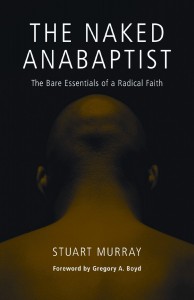The Naked Anabaptist
 I recently finished a thought-provoking book called The Naked Anabaptist by Stuart Murray. I loved the depth of history and unique perspective the book provides. Some of the layout of the chapters seemed odd to me (like the history of the movement in the second to last chapter and the last chapter focused on issues with Anabaptism). It is easy to get confused with this topic. One immediately jumps to ideas of Amish or Mennonites or other unique experiences. Instead of thinking of Anabaptism as a denomination in and of itself, think of it as a tradition of Christianity. In that light there are some intriguing notes to study. Murray explains it this way:
I recently finished a thought-provoking book called The Naked Anabaptist by Stuart Murray. I loved the depth of history and unique perspective the book provides. Some of the layout of the chapters seemed odd to me (like the history of the movement in the second to last chapter and the last chapter focused on issues with Anabaptism). It is easy to get confused with this topic. One immediately jumps to ideas of Amish or Mennonites or other unique experiences. Instead of thinking of Anabaptism as a denomination in and of itself, think of it as a tradition of Christianity. In that light there are some intriguing notes to study. Murray explains it this way:
In many nations, then, not only in Britain and Ireland, there are growing numbers of neo-Anabaptists and hyphenated Anabaptists. Neo-Anabaptists identify with the Anabaptist tradition and are happy to be known as Anabaptists, but have no historic or cultural links with any Anabaptist-related denomination. Hyphenated Anabaptists find inspiration and resources in the Anabaptist tradition, but do not identify themselves as Anabaptists. They might be Baptist-Anabaptists, Methodist-Anabaptists, Anglican-Anabaptists, Pentecostal-Anabaptists, or various other combinations.I think the biggest surprise of the book to me was how much I already agreed with without realizing it. It seemed that much of it focused, both historically and currently, on nonviolence, believer’s baptism, and community. Nonviolence
“What would happen if Christians devoted the same discipline and self-sacrifice to nonviolent peacemaking that armies devote to war?†Because conflict is multifaceted, so must our responses be as we explore strategies for making peace “between individuals, within and among churches, in society, and between nations.†Perhaps, then, one of the first steps in “learning how to make peace†and “finding nonviolent alternatives†is to develop “peace churches†that nurture unconventional reflexes and free our imaginations to explore creative possibilities.Baptism
In the case of the Anabaptists, it was their rejection of infant baptism and their insistence on baptizing believers (even if they had been baptized as infants) that prompted their opponents to label them “Anabaptists†(“rebaptizersâ€). For Anabaptists, believers baptism was not the central issue, but it was the symbol of the central issue: what does it mean to be a follower of Jesus and what kind of community nurtures such discipleship?Community
Some friends of mine have planted a church in East London with Anabaptist values and a simple motto: “No eating, no meeting!†Others have been involved in “table churches,†developing “table liturgies†that integrate prayer, food, conversation, biblical reflection, sharing of bread and wine in remembrance of Jesus… However, the majority of Anabaptists did not practice “community of goods†but “mutual aid.†This meant that they continued to own property and possessions, but made these available freely and gladly as they encountered others in need. It is this approach to economics that has characterized most Anabaptist communities. The Anabaptist tradition might ask whether lower living standards and reduced security could be at least as conducive to genuine spiritual growth as listening to sermons, participating in worship services, or visiting retreat centers.Other interesting notes:
The Anabaptist movement began at a time when the Bible was newly available to people. The reformers appeared to Anabaptists to have a flat Bible, picking out principles from anywhere without reference to the unfolding purposes of God. The Anabaptists rejected this approach and insisted that the Bible needed to be interpreted in light of the teachings and example of Jesus. Bible study that does not lead to more faithful and creative discipleship is inadequate.
Do You Want to Read the Bible Without Falling Behind?
Sign up your email and I’ll send you a PDF to download and use my custom-made reading plan system. There’s no way to fall behind on this system and every day will be different no matter how long you use it!
I’ll send future content directly to your inbox AND you can dive into the Bible like never before.




